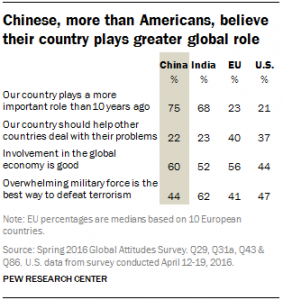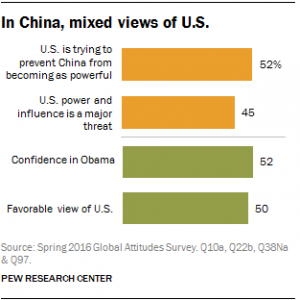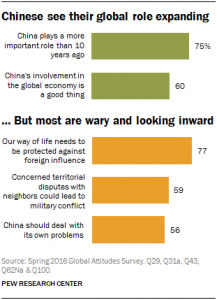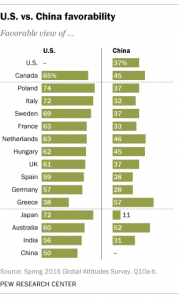Chinese More Confident of China’s Role in the World
The Pew Research Center (PRC), the polling and research arm of the Pew Charitable Trusts, conducts annual surveys of global attitudes and trends that provide useful glimpses into and analyses of world opinion on various social and political issues. Its most recent poll of 3,154 Chinese respondents across the country last spring (results and analyses came out in early October) on the Sino-US dichotomy sheds light on the growing confidence of Chinese nationals about their country’s economic prospects and role in the world.
The most striking finding of the poll was that a full 3/4 (75%) of the respondents recognized China’s growing prominence in world affairs as opposed to 10 years ago with only 10% dissenting. Significantly, just under half of the interviewees (45%) said “the US is a major threat” facing the country and the world, more so than other potential threats such as the Islamic State, global economic turbulence, climate change, cyber-attacks, and others. In addition, 52% believed the US is trying to prevent China’s rise as an equal great power with only 20% thinking the US is magnanimous enough to accept China’s ascent.
In part, this confident view of China’s role stems from perceptions of how China is doing in the global economy. Compared to their European and American counterparts, most Chinese (60%) believe the country has benefitted immensely from its involvement in the global economy in terms of opening new markets and exploiting opportunities for growth with only 23% saying the contrary. What’s more, 76% believed economic conditions will a little or a lot better over the next 12 months and even more (82%) say the economic prospects of the next generation will be better than the current one.
In fact, PRC surveys indicate consistent and overwhelming satisfaction with the direction of their country for over the past decade, the only exception being in 2002 when just 48% said they were content. This is hardly surprising since 41% of China’s economy was trade driven in 2015, up 11 percentage points from 1990 but down 24 point from the high point in 2006. The IMF projects 6.6% GDP for China this year and a little lower next year. By comparison, just 42% of respondents in 10 EU countries and 44% in the US say their economies are doing well.
At the same time, however, Chinese citizens remain somewhat reticent about getting more involved overseas while being wary of increased outside influences. Despite confidence in their own economy, 77% suggest their way of life needed to be protected from foreign influences, surprisingly up 13 percentage points since 2002. Moreover, 59% were worried that territorial disputes with neighbouring countries could lead to armed conflict. As well, a majority (56%) wants the government to focus on China’s own problems as opposed to getting more involved abroad either politically or economically.
Interviewed by the Las Angeles Times newspaper, Bruce Stokes, director of Global Economic Attitudes program at the PRC and one of the authors of the report, concluded, “(The Chinese) think they play a bigger role globally than they did 10 years ago, and they’re pretty happy about that. And that does reflect an underlying reality, in the sense that it’s indisputable that China is more important. They could be full of themselves – but by the same token, they’re very worried about foreign influences. There is this combination of self-confidence, and at the same time, real wariness. I can’t explain that, but it seems it’s something we need to pay attention to – because there is an unease there…”
In this connection, a PRC survey conducted a year earlier on how the world views the US versus China offered a couple interesting takeaways: First, a slight majority (51%) of respondents across the world still regarded the US as the leading economic power, almost double those who perceived the reverse (26%). Yet, in the same breath, most people believe China either will eventually replace or already has replaced the US as the world’s leading superpower. Second, in terms of the US’s geopolitical rivalry with China, US’s “pivot” to Asia, both economically and militarily, received general public support on both sides of the Pacific.
The Trans Pacific Partnership trade and investment treaty that excludes China, pushed hard by the Obama Administration but openly opposed by both presidential contenders, is supported by majorities or pluralities in five of eight TPP countries who say it is more important to have strong economic relations with the US than with China. On the military front, half or more of the publics in six of ten countries think America’s rebalance of 60% of its military forces to the Asia-Pacific is a good thing for peace and stability in the region.
It would be interesting to see a new survey done in light of the foreign policy reversal of Philippine President Rodrigo Duterte and the start of various multilateral economic and banking initiatives pursued under Xi Jinping’s presidency; namely, the Asian Infrastructure Investment Bank, the BRICS bank, One Belt One Road, various free trade area talks proposals, and numerous infrastructure projects being undertaken by China around the world.




